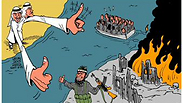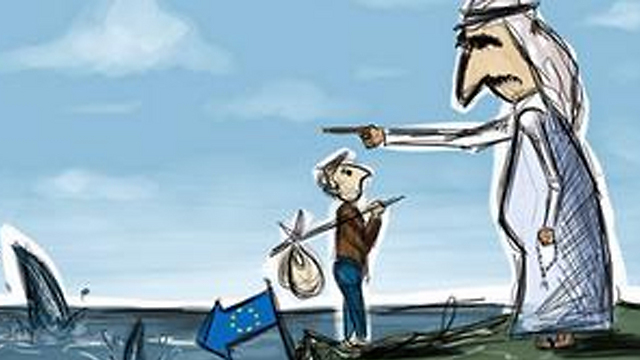
'Even Israel debated taking refugees,' say critics in Arab world
Faced with mounting criticism over their refusal to accept refugees, the Gulf monarchies have launched a campaign to combat the claims, saying that they have donated millions and accepted vast numbers of Syrians as migrants.
Photos of 3-year-old Aylan Kurdi, the young Syrian boy who drowned while fleeing the country with his family, have sparked rage within the Arab world, mainly against the rich Gulf states. The criticism has mainly surrounded the fact that the rich Gulf states have yet to take in refugees, while much smaller and weaker Arab states like Jordan and Lebanon have taken the brunt of the crises.
On the backdrop of increasing criticism, the Gulf States have launched a massive PR campaign across a spectrum of media outlets in an attempt to quash claims of refugee denial.
Saudi journalist Tariq Alhomayed was one of the many Saudi's who took the anti-Gulf state rhetoric very personally, writing an emotional article which attempted to dispute the criticism, and even mentioned the debate within Israel surrounding the Syrian refugees: "We must be truthful and clear: its shameful that Israel has debated accepting refugees while others incite against the Gulf states, instead of confronting the merchants of the false 'opposition'."
He continued to state that, "It is shameful for the Islamic organizations, mainly the Muslim Brotherhood, and those who seek to take ownership of Arabism. It’s a shame to Iran and her proxies that Israeli is debating the option of taking refugees while Assad murders Syrians with chemical weapons, barrel bombs, and with Iranian money."
Saudi Arabia's ambassador in Italy, Dr Rayed Khalid A. Krimly, said this week that, "30 to 40 percent of all of Saudi Arabia's residents are not Saudis." Krimly continued to say that, "This figure includes a million and a half Yemenis, and more than 500,000 Syrians." According to him, since the outbreak of the Syrian and Yemeni crises, Saudi Arabia has granted the two peoples the right to receive resident status in the kingdom, forgoing the normal authorizations and conditions.
"We haven't called the migrants refugees because they have received the residency permits legally, which allows them to enjoy all the education, health, residency, and labor benefits," the Saudi ambassador said, and reiterated that his country was the largest contributor to Syria and Yemen's humanitarian aid programs. The Gulf owned and London based Al-Hayat paper reported Thursday that, "Saudi Arabia is host to 500,000 Syrian refugees, and its schools are open to about 100,000 Syrians."
According to an official in the Saudi Foreign Ministry, since the beginning of the Syrian crises, the kingdom has taken in no less than 2.5 million Syrians, insisting that they were not treated as refugees or stuffed into refugee camps, but were in fact granted freedom of movement - in order to preserve their honor.
The UAE was quick to follow the Saudi example, with a government official telling CNN in Arabic that no less than 100,000 Syrian refugees had made their way to the Emirates since 2011, where they were granted temporary residency permits. This figure would put the number of Syrians in the Gulf country at 250,000.
Similarly to the Saudis, the Emirates had pointed at large scale funding for Syrian humanitarian programs, "The United Arab Emirates has donated $530 million in aid since the beginning of the Syrian crises, and has pledged an addition $100 million," the government source said.
Kuwait has also reacted to the backlash, saying the country would provide Syrians currently staying in the country with long term residency permits when their temporary status expires.
The reactions provided by the Gulf States have seemingly failed to quell the backlash from refugee organizations, and the reactions of several international followed soon after the publication of the statements. "To me, buying your way out of this is not satisfactory," Peter Sutherland, Special Representative of the UN Secretary-General for Migration and Development told a news briefing in Geneva last week. "And I say that taking refugees is separate from giving money."
An investigation conducted by Reuters revealed that none of the six Gulf Cooperation Council states - Saudi Arabia, Oman, United Arab Emirates, Kuwait, Bahrain and Qatar - has signed the U.N. convention on refugees which has governed international law on asylum since World War Two. The report continued to say that like the rest of the expatriates that form a majority in many Gulf States, Syrians have been admitted mainly as temporary guest workers, which generally means they must have jobs lined up before they arrive, or as their family dependants.
The Gulf States are mainly worried about the political, social and economic impact of an influx of refugees, especially fellow Arabs, who might settle permanently and demand broad civil rights that temporary guest workers know not to expect.
"We're talking about countries whose nationals are in the minority," said Sami al-Faraj, a Kuwaiti security adviser to the GCC. "When it comes to the issue of refugees, we have taken a stand and that is to actually help (other) nations settle refugees."
Both Qatar and the UAE currently maintain populations of which 80 percent are foreign citizens. Saudi Arabia's population includes 40 percent foreigners, while Kuwait has 50 percent. The Gulf states have mentioned that the UK in comparison has an eight percent foreigner population.
"Gulf countries are scared about more traffic on the streets, longer waiting periods in free government medical facilities, additional pressure on subsidized goods, and more use of subsidized electricity and water," Ali al-Baghli, a lawyer and former Kuwaiti parliamentarian and oil minister, said in a statement to Reuters.
Another facet of the refugee crises is centered on the security issue. The London based and Qatar aligned "Al Arabi Al- Jadid" newspaper reported on this issue with the headline "The Gulf and the refugees- support but no welcoming party." The article stated that the official stance of the Gulf states on the refugee issue is centered around the security debate, including terrorist groups using the crises to funnel into Gulf under the guise of Refugees.














